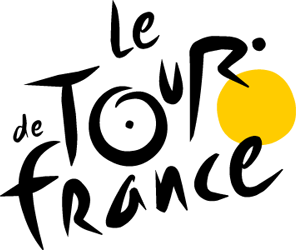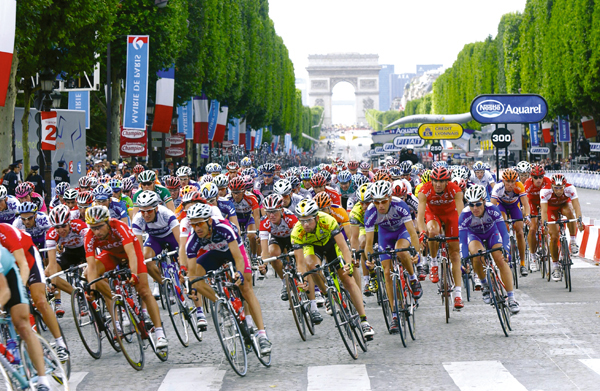“I think fairness comes before being selfish. There’s other things to think about than the yellow jersey.”
– Fabian Cancellara

That quote was by one of the top contenders in this year’s Tour de France who dropped out of the race to attend the birth of his second child, saying that he needed to be there for his wife. Above all, he said, he is first a husband and father. Well, in my book, he’s already a winner. And he’s right on all counts even though it must have been an emotional decision in every way for him. But, yes, there definitely ARE other things to think about than winning a yellow jersey or a gold medal or a first place anything.
I’m writing about this famous bicycling race because quite frankly I’m obsessed with it. Along with the Olympics the Tour de France is one of those jaw-dropping sports that leave people like me transfixed and wondering why? Is it worth the holy hell crashes and near-deaths and losses and gut-wrenching misses just seconds from the cross-the-line-win? How does it happen that seemingly perfectly sane (or so it appears from my TV vantage point) athletes are wired to turn into mad peddling machines, starting out major hunks and ending as gaunt stick figures by the time they’ve torn up the mountains and plains, the Pyrenees and Alps—literally an entire tour of France in less than three weeks time!????
I’m exhausted watching this heart-pounding madness since the races just began. But Pete and I can’t stop tuning into it. And I must say that Pete is one patient husband, for millions of reasons, but when it comes to me watching Le Tour with him he’s very kind. Because really I absolutely don’t understand one damned thing about it. Wait. I thought that guy was the winner. What does that mean? How many winners are there?
Nothing makes sense.
I do know that it’s more than a bunch of guys going really fast on bikes until they nearly die. I’m learning that it’s more than one big race and that big clump of undulating bikes is called a “peloton” –not a big clump of bikes. The word “peloton” is French for “ball” or “platoon.” And within that mass of pelotonity (my word not theirs), teammates provide lots of protection to their leaders. They’re providing something called “drafting” to help their leader conserve energy better.
I’m learning that Le Tour is lots and lots of races within races within races and all kinds of other competitions unfolding nearly every single day for the three weeks or so that 200+ cyclists on 20+ teams wind their way through France 170-200 kilometers at a time (a little over a hundred miles a day!).
But that guy is racing really fast and looks like he’s going to win but wait, he’s being told to slow down to help his other team mate who is meant to be the leader. What? And wait, those two are talking to each other as they compete against each other. Another one hands off food and water to his team mate flying by. But when one crashes and falls no one is to stop and help him, that’s the work of the medical teams and coaches following from behind. The guy somewhere peddling his heart nearly out of his chest who’s a bunch of cyclists back is announced as one who will be a winner along with the other winners but he won’t be King of the Mountains for that day but he’ll still get a jersey and… oy vey. My head hurts.

What I’m learning is that it’s not a solo sport. It’s all about the team. One guy wins big and the whole team gets cash rewards too. So it really is a team thing even though there is a crowning king thing. Every day a rider can win a stage. I encourage you to watch this extraordinary athletic feat with me. It’s humbling. And with it you get a chance to hear these gorgeous French words described so melodiously by the excellent commentators, their beautiful European accents describing what we’re seeing: chateaus, monasteries, vineyards and quaint fishing villages, along with listening to the cadence of the leading racers’ names—Greipel, Cavendish, Wiggins, Sagen, Cadel, Froome, etc. Colorful greetings are spelled out in balloons and waving lines of villagers and flags and banners and even skiers all seen from helicopters and camera-filled vans.
But what I mostly get out of this phenomenal Tour of all Tours—which finally culminates in Paris with several laps up and down the Champs Elysées—is not only the wonder of how far and fast and powerful the human body can go when driven and fueled by a passion these gifted athletes have had practically since the day they were born. But something more. This sport in particular is dependent on the dynamic cooperation of the team working together. That is the beauty of what I love about it.
Still in the end, as Fabian Cancellara expressed, though the yellow jersey is the shiny “carrot,” it’s not what life is all about. Being fair to each other. Your teammates. Your loved ones. Yourself. That’s what the real deal is all about—or should be. Of course, the race is astounding and the competition fierce. But we mustn’t lose sight of reaching our own personal best to do the right thing. If that means dropping out of the race to be with a loved one, then that’s something we should all strive to accomplish. When we step—or race—aside of our own ego the heart shines brighter.
So you’re right, Fabian. Fairness does come before selfishness and your home team should be more important than your racing team. Vive le brand new baby! Vive le Tour de France! (As far as I’m concerned those guys should ALL be considered winners!)
What do you think? Love to read your comments.
